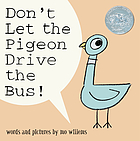So what happens when you read Mo Willems' delightful Don't Let the Pigeon Drive the Bus! with your child? Your child, who may or may not deep down have been wanting to drive that metaphoric bus (Motor Boat, motor boat!!!), realizes that Every Pigeon wants to drive buses. Your child also realizes that other Every Pigeon nags too, still doesn't get to drive the bus, but still doesn't give up trying.
And all in 159 words with great pictures. That's quite a package.
Not convinced? Well, what happens when you read Eric Litwin's life changing Pete the Cat? I'm smiling while I think about it: Pete the Cat is here to tell us that no matter what we step in, "It's all good." What a great mantra. A heavy helping of optimistic outlook plus a little color theory on the side.
I love the way moms hold their tiny babies before me and urge them to say thank you to me, even when they can only sign it, by touching their fingertips to their lips. Having good manners for others shows respect for others, and that's wonderful. But how amazing to be able to teach children not just good manners, but an understanding and empathy for other people's emotional needs.
By reading Pete the Cat.
I love the way moms hold their tiny babies before me and urge them to say thank you to me, even when they can only sign it, by touching their fingertips to their lips. Having good manners for others shows respect for others, and that's wonderful. But how amazing to be able to teach children not just good manners, but an understanding and empathy for other people's emotional needs.
By reading Pete the Cat.
Your Brain on Fiction
Published: March 17, 2012
(Page 2 of 2)
Raymond Mar, a psychologist at York University in Canada, performed an analysis of 86 fMRI studies, published last year in the Annual Review of Psychology, and concluded that there was substantial overlap in the brain networks used to understand stories and the networks used to navigate interactions with other individuals — in particular, interactions in which we’re trying to figure out the thoughts and feelings of others. Scientists call this capacity of the brain to construct a map of other people’s intentions “theory of mind.” Narratives offer a unique opportunity to engage this capacity, as we identify with characters’ longings and frustrations, guess at their hidden motives and track their encounters with friends and enemies, neighbors and lovers.
It is an exercise that hones our real-life social skills, another body of research suggests. Dr. Oatley and Dr. Mar, in collaboration with several other scientists, reported in two studies, published in 2006 and 2009, that individuals who frequently read fiction seem to be better able to understand other people, empathize with them and see the world from their perspective. This relationship persisted even after the researchers accounted for the possibility that more empathetic individuals might prefer reading novels. A 2010 study by Dr. Mar found a similar result in preschool-age children: the more stories they had read to them, the keener their theory of mind — an effect that was also produced by watching movies but, curiously, not by watching television.
.




No comments:
Post a Comment